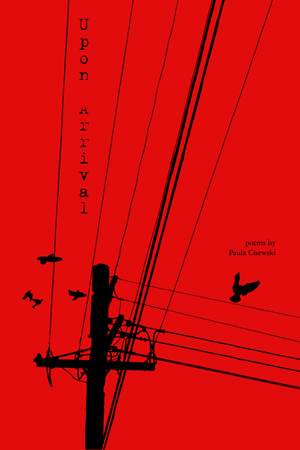In Love With Changeful Language: Paula Cisewskis Arrival
Erin Lynn Marsh reviews Paula Cisewskis book Upon Arrival and finds it goodpleasingly anomalous.

Upon Arrival, Paula Cisewski
Black Ocean Press
A funny thing happened when I discovered that the poet whose collection I was preparing to review was from my same hometown; I made assumptions about both her and her work based on the fact that she was born in Bemidji, Minnesota. See, there is a type of poetry that I refer to as typically Northern Minnesotan: it usually involves the Northwoods, the Mississippi river, lakes, loons, deer, bears, etc. I think a perfect example of this type of poetry is the following excerpt from Susan Carol Hauser’s poem “Reflection”:
The lake is quiet today
bereft of wind,
even of breeze,
the blue of the sky
laid out on the surface.
I am not saying that this type of poetry is bad or not worthy in anyway of praise. I am simply saying this is the kind of poetry I think of when I hear that the poet is from Northern Minnesota.
While reading Paula Cisewski’s first poetry collection, Upon Arrival, I was surprised to discover a poet not so much in love with the natural world, but in love with language and its often changeful, frenetic nature. Upon Arrival is divided into three sections: “Fallings From Us,” “How Birds Work”, and “Upon Arrival”. Although the collection takes its title from the third section, its heart is clearly from the second. Cisewski often writes in tense, clenched, bird-like lines and we flit with her from stanza to stanza, as in this example from “Lucky Poem”:
Sitting, imagine
luck is a bird, a starling
that shoos off the pecking flock.
Then stop. It’s not right.
Luck must be a lovebird.
In the above example, the bird is a symbol for luck. However, other times the bird is a symbol for human soul, as in the poem “Springtime”:
A cardinal cat-calls
the morning. Bawdy-songed, he calls
the day like a cat: daring
a “cute” predator with sleep inside it.
A lonely bird, or he wouldn’t sing
near us. Desiring out loud. At us?
Let’s don’t feel bad,
he’s singing with us. What
is that winter bird doing singing
redly between the tight green buds?
Will spring cancel him?
Will a cancelled bird leave room for
?
Like inside people,
how we have so many
birds not in our hearts?
Cisewski’s use of the bird as a symbol for multiple intangible aspects of the human experience is evidence of her fluency in the language of the human heart. But it is also evidence of her ability to write about these things without sentimentality. This is a stunning first collection and renews my faith in Northern Minnesota poetry.